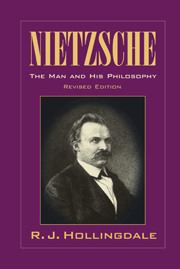A List of Nietzsche's Works
Published online by Cambridge University Press: 13 September 2019
Summary
In the large body of work published under Nietzsche's name during his life and since his death it is necessary to make a distinction between his genuine 'works’ (i.e. those books published by him or prepared by him for publication) and all the remaining material (i.e. Nachlass [material left behind after his collapse and death], philologica, juvenilia): for the former group Nietzsche is responsible, for the latter he is not, since its distinguishing characteristic is that he did not offer it to the public as his ‘work’. Yet, mainly through the publication of The Will to Power—a compilation drawn from the Nachlass of the 1880s—the dividing line between these two groups has become blurred and the logical and orderly development of his philosophy obscured. If we are to attempt to trace that development we must first be clear where it is to be discovered—i.e. in the ‘works’. It would also be well to fix in advance the order in which Nietzsche's works appeared, since this is obviously of importance to any consideration of how his thought developed. For these reasons I give here a chronological list of Nietzsche's works as defined above. (The initials by which they are cited in the text are given on the right.)
1.Die Geburt der Tragôdie, oder Griechentum und Pessimismus (The GT Birth of Tragedy, or Hellenism and Pessimism). Published 1872, under the title Die Geburt der Tragôdie ans dem Geiste der Musik (The Birth of Tragedy out of the Spirit of Music), and consisting of 25 sections, with a ‘Foreword to Richard Wagner’. 2nd edn. 1874 embodies some textual changes. 3rd edn. 1886 bears the altered title given above, and is prefaced by an ‘Essay in Self- Criticism’: although termed a ‘new edition’ it is in reality a reissue of remaining copies of the two previous editions (with the title changed and the prefatory essay added). The text quoted in the present work is that of the 2nd edn.
2.Unzeitgemasse Betrachtungen (Untimely Meditations). Erstes Stuck: David Strauss, der Bekenner und der Schriftsteller. UI (First Essay: David Strauss, the Confessor and the Writer.) Published 1873. A long essay in 12 sections. Zweites Stuck: Vom Nutzen und Nachteil der Historié fur das UII Leben. (Second Essay: On the Usefulness and Disadvantage for Life of [the study of] History.) Published 1874.
- Type
- Chapter
- Information
- NietzscheThe Man and His Philosophy Revised Edition, pp. ix - xivPublisher: Cambridge University PressPrint publication year: 1999



